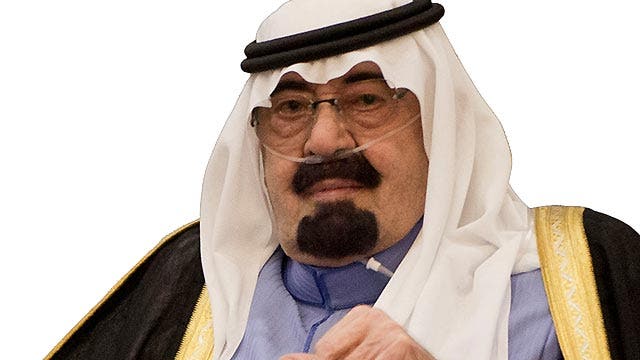King Abdullah of Saudi Arabia's death and its impact
King Abdullah of Saudi Arabia was a powerful US ally who joined Washington's fight against Al Qaeda and sought modernization
This is a rush transcript from "On the Record," January 22, 2015. This copy may not be in its final form and may be updated.
MARTHA MACCALLUM, 'ON THE RECORD' GUEST HOST: First tonight, this FOX News alert. Saudi Arabia's King Abdullah has died. He is said to be 90 years old. King Abdullah was a powerful U.S. ally who had a close relationship over the years with U.S. presidents.
For more on this breaking news -- just moments ago we got word of this -- we're joined tonight by former Deputy Assistant Secretary of State, Liz Cheney.
Liz, good evening. Good to have you with us tonight.
LIZ CHENEY, FORMER DEPUTY ASSISTANT SECRETARY OF STATE: Good evening, Martha. Thank you.
MACCALLUM: Your reaction to this news.
CHENEY: Well, of course, any time you have a succession in a country as important as Saudi Arabia it's a very big deal. King Abdullah, as you said, was a long-time friend of the United States. We didn't always agree. He was somebody who provided real leadership for his nation and friendship with the U.S. That's a critically important relationship.
We know that the new king will be Crown Prince Salman, who will be taking over, who himself is quite old, and some say not in very good health. The new crown prince will be Prince Mukran. Mukran is the last of that generation of sons of King Abdulaziz. There will be a real issue once Mukran becomes king as to how the succession will go from there.
But a couple of things to watch. One will be the relationship with Syria. Because the Saudi opposition to Bashar Assad was, in part, based on policy and, in part, based on personal animosity. Bashar Assad once called King Abdullah a half man. And now that that personal element is gone, it will be important to watch how the Saudi relationship with Syria goes.
Second thing to watch will be what happens internally in Saudi Arabia. King Abdullah was known as someone who would push for reforms, particularly with respect to women, with respect to having co-ed education in the kingdom. Women are now going to be allowed to vote in upcoming elections. He would push for those reforms even when the religious establishment was pushing back against him. It's not clear whether Crown Prince Salman will be willing to push as much as King Abdullah did.
MACCALLUM: Those ideas seem, you know, very outdated obviously to those of us in the United States. But when you look at them in contrast to Sharia Law and what we are seeing imposed on young women in the Middle East, the atrocious way that women are treated in some of these countries, it makes him look like a real progressive. As you say, it's been a very complicated relationship. But so much is unsettled, Liz, obviously, in the Middle East with what's going on in Yemen. Is there potential here for something dangerous?
CHENEY: Well, certainly. I mean you have a situation where -- you know, this has been a very bad day for America and her allies. You have now essentially, with the collapse of the government in Yemen, got Iran basically in control of at least four capitols in the Middle East: Saana, Baghdad, Damascus, and potentially Beirut. And I think that you will continue to see a very strong Saudi desire and willingness to stand up against Iran. I don't anticipate that will change. That goes to the very heart of their national interest of, you know, who is the custodian of the two holy mosques in Saudi Arabia.
But it is an unsettled time. It's a real opportunity, frankly, for this administration and this president to try to rebuild the relationship. I mean, it takes real effort to have a situation where our relationship with Israel is in the tank and our relationship with Saudi Arabia is in the tank. And we have managed both of those things under this president.
MACCALLUM: Very quickly, Liz, would you expect President Obama to reach out to meet with the new leader of Saudi Arabia? What would you expect?
CHENEY: I guess I would like to say two things. One is I hope they do more than to send James Taylor over to the funeral to pay respects to the new king. Obviously, they ought to send a very high-ranking delegation to demonstrate the importance of the relationship.
One other thing is, watch, there is a young man named Prince Ahmed, who is the son now of the new king. And it will be important to watch him. He has been the chief of the royal court while his father has been crown prince. He is somebody who has wielded a tremendous amount of power. He is somebody to keep your eye on and watch, as we see this transition go forward, whether he will pay that same role as his father as he becomes king.
MACCALLUM: Thank you, Liz. You have laid out a lot of important moves that will take place here in Saudi Arabia. We appreciate it. Good to see you, as always.
CHENEY: Thank you, Martha. It's good to be with you.






















